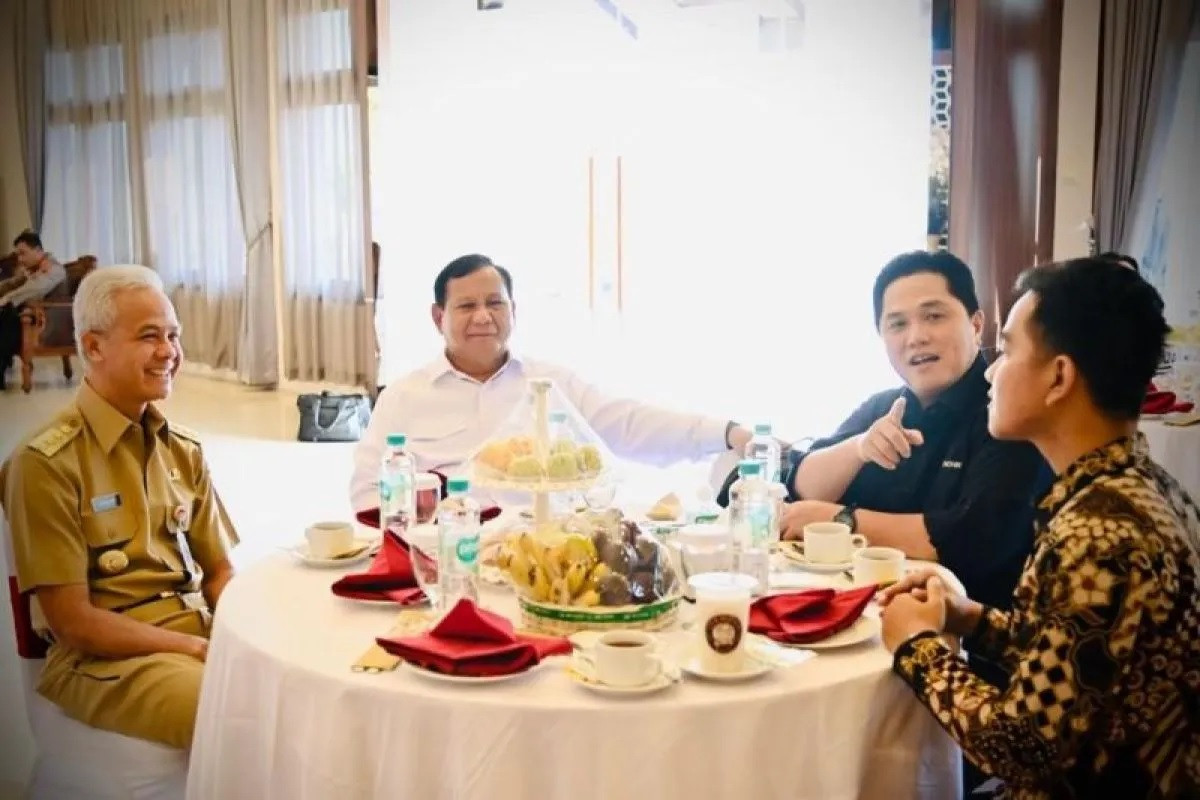Popular Reads
Top Results
Can't find what you're looking for?
View all search resultsPopular Reads
Top Results
Can't find what you're looking for?
View all search resultsReverse political ageism?
Whatever the age minimum for the presidency is, we need to have strong and transparent reasons for setting it.
Change text size
Gift Premium Articles
to Anyone
 Surakarta Mayor Gibran Rakabuming Raka (right), who is President Joko “Jokowi” Widodo’s eldest son, chats with (left to right) Central Java Governor Ganjar Pranowo, Defense Minister Prabowo Subianto and State-Owned Enterprises Minister Erick Thohir at the lounge of Adi Soemarmo Airport in Boyolali, Central Java, on July 24, 2023. (Antara/Press Bureau of Presidential Secretariat )
Surakarta Mayor Gibran Rakabuming Raka (right), who is President Joko “Jokowi” Widodo’s eldest son, chats with (left to right) Central Java Governor Ganjar Pranowo, Defense Minister Prabowo Subianto and State-Owned Enterprises Minister Erick Thohir at the lounge of Adi Soemarmo Airport in Boyolali, Central Java, on July 24, 2023. (Antara/Press Bureau of Presidential Secretariat )

The current petition with the Constitutional Court challenging the age minimum for presidential candidates is a case of doing the right thing at the wrong place and time.
We are, in principle, in favor of lowering the minimum age for the nation’s top job, which is currently 40, as set by the 2017 Elections Law. This is not because we believe younger politicians are better than their senior counterparts but simply because age is no guarantee of good leadership qualities, and regardless of political preference, we would all benefit from an expansion of the pool of talent eligible for the presidency.
Nonetheless, there is nothing inherently wrong with an age minimum for such a high-profile position. Such restrictions are not discrimination, provided they are “based on objective and reasonable criteria”, the International Covenant for Civil and Political Rights holds.
The United States’ founding fathers set the presidential age minimum at 35 years old, a policy that remains in place today. Meanwhile, Australia requires candidates for public office to be at least 18 years old, including for the office of prime minister. Even so, the youngest person to ever serve as Australian PM was Stanley Bruce, who was elected to the post when he was 42 years old.
Age, in these contexts, serves as an imperfect proxy for something more fundamental: experience. The number itself somewhat arbitrary, even though we know it can take years for most people to get enough experience to be presidential material.

Whatever the age minimum is, we need to have strong and transparent reasons for setting it. That is why we are calling on the Constitutional Court to leave the decision to the legislature and executive. They will be required to consult with the public before deciding anything.
There is no reason for the court to make any specific changes to the presidential age minimum. The question is not one of legal doctrine but rather of societal preferences; there is no global standard.
The judicial review motion bears similarities to the proposal made by certain lawmakers to the change from an open-list to a closed-list electoral system for the 2024 election. In both instances, it is within the authority of policymakers to decide which system to use, provided the process is careful, above-board and involves the public. If policymakers feel the need to change the presidential age restriction, as certain political parties have advocated, then they should have revised the Elections Law long before preparations for the 2024 polls began.
It is hard to overlook the short-sightedness of the petition. It is widely rumored that it was filed to pave the way for Gibran Rakabuming Raka, the eldest son of President Joko “Jokowi” Widodo, to join the 2024 presidential race. The 35-year-old politician has been tapped as a potential running mate for either Prabowo Subianto or Ganjar Pranowo.
The President has claimed he will not interfere with the court, which is now led by his brother-in-law Anwar Usman. Gibran himself has played down the proposal, saying he is too young for the job. But he has yet to categorically say no to the idea of running for VP in 2024.
The court must resist political pressure in considering whether to alter a policy that would shape the trajectory of our democracy just before an election. Really, the choice is one for policymakers, not the court, and should certainly not take place now, just months before presidential election registration begins.









